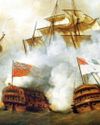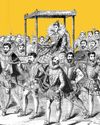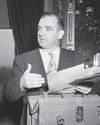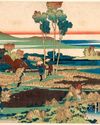
The campaign of 1806 began with the French victories of Jena and Auerstedt against the Prussians. Napoleon Bonaparte, having captured most major cities of Germany, marched east to crush remaining enemy forces. In December of the same year the Russian army came to the rescue of Frederick William III and his men who were retreating toward western Prussia. The first battles against the French, such as Czarnowo, Pultusk and Golymin, resulted in more Napoleonic victories but failed to bring a decisive result. In January 1807 General von Bennigsen, a German officer commanding the Russian army, went on the offensive in east Prussia but was also forced to retreat after a French counteroffensive. If Napoleon managed to push back his foe, he failed to turn the enemy. After being pursued for days Bennigsen decided to make a stand with his Prussian allies at Eylau on 7 February 1807.
Having chased the enemy for 11 days in the bitter cold the French army was exhausted. Napoleon's forces were made up of 54,000 soldiers and 200 guns: the III Corps (15,000 men led by Davout), the IV Corps (16,500 men led by Soult), the VII Corps (6,500 men led by Augereau), the imperial guard (6,000 men) and the cavalry reserve (10,000 men under Murat). Ney's VI Corps (9,000 to 10,000 men) was pursuing a Prussian Corps but was expected to arrive on the battlefield. On paper, the Russian army was stronger with 67,000 men.
Bennigsen was also hoping to be reinforced by the Prussian Corps of Lestoc (10,000 men).
This story is from the Issue 148 edition of All About History UK.
Start your 7-day Magzter GOLD free trial to access thousands of curated premium stories, and 9,000+ magazines and newspapers.
Already a subscriber ? Sign In
This story is from the Issue 148 edition of All About History UK.
Start your 7-day Magzter GOLD free trial to access thousands of curated premium stories, and 9,000+ magazines and newspapers.
Already a subscriber? Sign In

STALIN HAD CONTINUED WEST AFTER BERLIN?
Having used the Allies for his own ends, the Soviet dictator plots to overthrow the rest of Europe

THE GLORIOUS FIRST OF JUNE
ATLANTIC OCEAN, 400 NAUTICAL MILES WEST OF USHANT 28 MAY - 1 JUNE 1794

LIFE AS AS A GODDESS
Jasmine Elmer uncovers the complexity and darker sides of ancient deities and delivers history with soul

TUDOR FASHION TIPS
From farthingales and ruffs to codpieces, ten ways to achieve the styles of the Tudor court

THE FIRST AMERICANS
Discover indigenous life before the colonists landed

THE LAVENDER SCARE
How a national fear of communism led to the American government outing and firing thousands of gay and lesbian workers

STARS BEHIND THE BARS
Ten iconic celebrity mugshots and the stories behind them

The Making of JAPAN
The rise of imperial power and a flourishing of the arts and culture in the Land of the Rising Sun can be traced back to the Asuka period

SIEGE OF TOULON
TOULON, FRENCH REPUBLIC SEPTEMBER-DECEMBER 1793

REDISCOVERING THE FORGOTTEN LIVES OF QUEER MEN
We speak to the editor of a groundbreaking new collection that uncovers what life was like for gay men when homosexuality was illegal in Britain